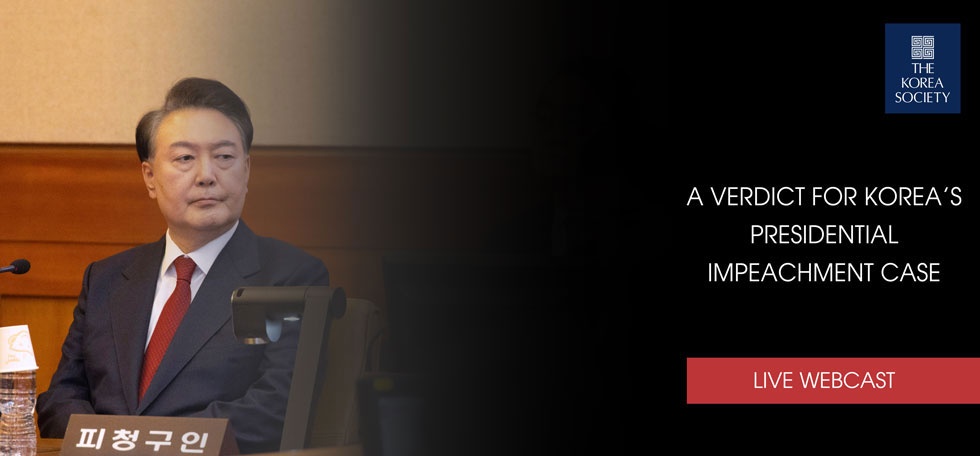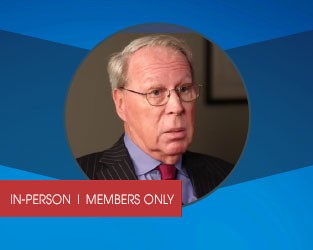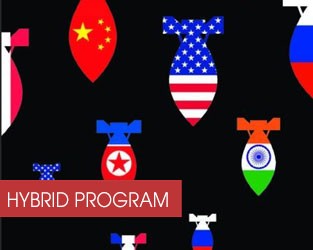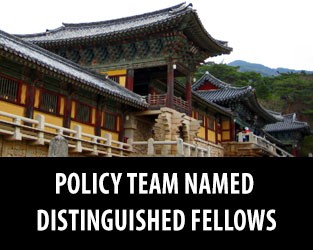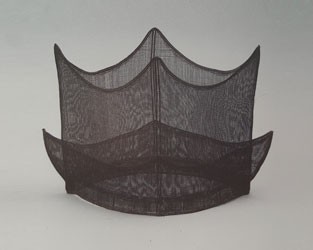NIKITA DESAI (Moderator):
Good morning, everyone. My name is Nikita Desai, and I am the Director of Policy and Corporate Programs here at The Korea Society. Thank you for coming this rainy morning.
"Follow-on FTA: Legal and Insurance Services," the second program in The Korea Society's corporate series, assesses progress in Korea's legal and financial sectors after implementation of the historic Korea-U.S. Free Trade Agreement six months ago. How have the legal and financial service sectors fared? What gains and losses have been achieved? Have new investments or partnerships been formed as a result of the FTA?
We have two excellent speakers to help us answer these questions today. Song Jung of McKenna, Long & Aldridge will be speaking with us from Washington, D.C. via video conference. Song Jung is the chair of the Intellectual Property and Technology practice and is also currently on the Board of Directors of The Korea Society. His practice focuses on all aspects of patent law including patent prosecution, validity and infringement opinions, litigation, licensing, technology transfer, and negotiation. Mr. Jung has counseled clients through numerous IP litigation matters covering a wide range of technologies and industries in jurisdictions worldwide, including matters that have resulted in some of the top IP verdicts in the past few years.
Also with us today is Mr. Bryan Pickel, Vice President of International Government Affairs at Prudential Financial. Mr. Pickel has worked with Prudential Financial since 1993 and in April 2008 was appointed to his current position, the first of its kind at Prudential. Mr. Pickel is responsible for leading the company's efforts on international public policy matters in Prudential's key international markets and the U.S. related to trade, market access, and international tax. In this role, Mr. Pickel splits his time between Washington, D.C. and Prudential's Newark, New Jersey headquarters. In addition to this role, he currently serves on the Services International Trade Advisory Committee and was a member of the U.S.-Korea Business Coalition's Steering Committee, where he worked on Korea-U.S. Free Trade Agreement issues.
We look forward to an invigorating discussion. Please give a round of applause to today's speakers. Song, would you care to begin? [Applause]
SONG JUNG:
Good morning. Thank you very much, Nikita, for that kind introduction. I sincerely apologize that I cannot be there in person this morning, but I am happy to be a part of today's program. One of my favorite topics of discussion is the recently passed U.S.-Korea FTA.
Law firms are anxious to do business in Korea, and many are awaiting approval from the Korean Ministry of Justice (MOJ). We established the Korean office of McKenna, Long & Aldridge in March of this year, and Andrew Park, a partner, is currently managing that practice. When the MOJ originally asked us for the address of our new office during the approval process (we hadn't actually opened an office at that time because we had no way of knowing if we would win approval) we decided to tell them we had, in fact, opened one. Fortunately, that worked out, and we expect approval any day now. The first six months have been tremendously exciting. I would like to share some of our experiences as well as explain the reasoning behind our desire to practice law in Korea.
I began my career as an electrical engineer. I was a test engineer for NASA and did some stimulating work on space flight to Mars, as well as in-orbit projects. Fortunately, I went for a J.D. instead of a Ph.D. Twenty-two years ago, I started practicing patent law. I never imagined I would be practicing law in Korea, yet I now visit the country several times a year. Practicing law in Korea is a key priority for our firm, as some of our largest clients are Korean.
A major lawsuit against a Korean smartphone company has certainly brought to the forefront Korea's need for proactive intellectual property protection. The Korean media have shown great interest in stories about U.S. law firms opening offices in Korea. This is partly due to the fact that the Korean market has been hungry for lawyers from the U.S. In addition, the FTA has given U.S. law firms the opportunity to open offices in Korea, and they certainly will be looking to hire Korean attorneys.
Let me briefly share a few facts about practicing law in Korea (everyone should have a five or six-page PowerPoint document) that my staff has provided. The last page notes that U.S. exports of FTA beneficiary items to Korea increased by 2.1% year-to-year while non-beneficiary items decreased by 14.6%. U.S. imports of FTA beneficiary items from Korea increased by 14.2% while non-beneficiary items decreased by 2.4%. The numbers look good for the first six months of the FTA.
The FTA states that the Korean Ministry of Justice and the Korean Bar Association must grant approval to a law firm to practice law in Korea. Sixteen law firms have applied to date. Eight have received approval from the Ministry of Justice and are either pending approval or received approval status by the Korean Bar Association. There is no indication that there will be an issue with the remaining eight firms, including ours.
McKenna, Long & Aldridge has found the process to be somewhat challenging. One of the last obstacles the MOJ placed in front of us (after we had submitted all the paperwork) was a request for the criminal record of Andrew Park, the lawyer running the office in Korea. I nervously asked him if he had done anything stupid within the last fifteen years. [Laughter] Fortunately, his record was clean. The MOJ then demanded we send Andrew's criminal record covering every state and jurisdiction in which he had resided during the previous ten years. It took us a couple of months to get this information, and it was submitted one month ago.
Opening a law firm in Korea is a gradual process. Any firm looking to establish an office in Korea will need to practice a great deal of patience, as the administrative and logistic issues are quite demanding. Europe also has a free trade agreement with Korea, and they are going through a similar process as the U.S. law firms. For the first two years, U.S. law firms can open an office and provide legal advice, but they cannot enter into any alliances with Korean firms. Two years from the effective date, they can create alliances with Korean firms and have cooperative agreements—even providing advice on Korean law.
At the five-year mark, U.S. law firms in Korea can hire Korean lawyers and establish joint ventures. At this point, I expect to see a lot of mergers and acquisitions between U.S., Korean (and most likely European) law firms. Although five years seems like a long time, Korean law firms are already formulating strategies for the development of partnerships and joint ventures with U.S. law firms, and U.S. law firms are preparing to do business not only in Korea but Asia, as well. Korean law firms are also beginning to do mergers and acquisitions among themselves, similar to U.S. law firms (who have been merging due to the troubled economy and in response to so many prominent firms closing over the last several years). For example, our law firm recently merged with Luce Forward of California.
I believe that this is going to happen at a much faster rate in Korea. Korean law firms will be positioning themselves to joint venture, merge, acquire, or be acquired by U.S. law firms. We're already seeing smaller law firms combining with larger law firms while contemplating their next strategy in the changing environment, and larger Korean law firms are merging into mega law firms. Within the next five years, we expect there to be a lot of activity among Korean, U.S. and European law firms seeking to increase their presence in Korea, forecasting the synergistic advantages emanating from the Free Trade Agreement.
I'd like to share with you a few observations about practicing law in Korea. One of the most important things is that the FTA will not remove all the barriers to practicing law or doing business in Korea. The FTA is not there to help you become successful. The FTA is a door allowing you entrance into Korea. As anyone knows, doing business in a new environment is usually difficult.
Of course, you need to learn the expectations of your Korean counterparts. One of my first obstacles was the language barrier. I had gained a lot of experience as both an attorney and a businessperson over the years, but the language barrier was a major problem for me, and I believe it will continue to be a significant issue. Korean-American attorneys are seeing a tremendous increase in job offers from U.S. law firms planning to move into Korea. Of course, it remains to be seen whether this trend will continue over the next five years. We know that Korean companies are interested in developing closer relationships with U.S. law firms. They are also looking for discounts. As Korean firms develop better relationships with U.S. firms, it will make it easier for them to negotiate.
On the flip side, many of our U.S. clients are enthusiastic about McKenna, Long and Aldridge having an office in Korea. A Korean presence suddenly gives our clients confidence that they will be able to successfully resolve any legal issues that arise while doing business in Korea. In truth, we can resolve the majority of our clients' problems without a Korean office, but certainly we reduce the psychological barriers by our presence in Korea, and the FTA has significantly contributed to that sense of well-being. As I said before, the FTA is not going to make you a better businessperson in Korea, but it does give a lot of U.S. (and Korean) corporations more confidence and reduce any psychological barriers to doing business between the two countries. I believe our firm has already benefitted significantly from having an office in Korea.
I'd like to give some final thoughts on the effect of the FTA on both short and long-term prospects for U.S. law firms in Korea. The short term reason why I urged our law firm to go into Korea was the preservation of current relationships. Client maintenance is a long-term goal, as well, and almost always results in a wonderful practice. That is our primary purpose. Long term, we look to be recognized as the premier firm for handling issues of U.S. law or Korean law. Because of barriers such as language and culture, Korean-American lawyers will be needed as advisors and counselors.
The legal market is a very competitive market, and there currently is not a lot of legal work to be done in Korea. Small to medium-sized companies struggle here in Korea just as they do in the United States, and one of the last things businesses want to worry about is paying for legal services. However, Korean companies have learned much from recent events, and many of the small to medium-sized firms realize they will need to address legal issues as they move into the U.S. market. Hopefully, U.S. attorneys transitioning into Korea will be able to assist them, creating a win-win situation for both Korean companies and U.S. law firms.
With that note, I'll hand the microphone over to Bryan. Thank you very much. [Applause]
BRYAN PICKEL:
Thank you, Song. Mark and Nikita, thank you for inviting me here today. Stu, it is wonderful to see you. It truly is a pleasure to be here this morning to discuss the implementation of the historic U.S.-Korea Free Trade Agreement, or as we all know it, KORUS. Prudential was and will always be an enthusiastic supporter of KORUS. We were active from the very beginning in the negotiation phase in both Korea and the United States, and we also maintained a strong presence in both Washington, D.C. and Seoul on the legislative side. We are now very active in the final stages of implementation.
As a result, Prudential considers KORUS a gold standard when it comes to financial services. KORUS was, arguably, the first time that the U.S. government focused intently on services (particularly financial services) in an international agreement. While a number of the financial service provisions do not take effect until March 2014, I'd like to highlight for you some of the notable changes that will provide benefits to both Korean and U.S. firms, and in particular to insurance providers. Before I go into the detail, however, I thought I'd make a few comments and give you some perspective about Prudential in Korea.
Foreign insurance firms have been active in Korea for over twenty-five years. In fact, Korea is Prudential's third largest market in the world behind the United States and Japan. We have had a fully functioning life insurance company in Korea (Prudential of Korea) since March 1991. We distribute traditional and protection life insurance products through more than seventy-five sales agencies throughout the country and have more than 1,200 agents in Korea. While Prudential Financial, Inc. of Newark, New Jersey owns Prudential of Korea; Prudential of Korea is truly a Korean company.
As many of us know, Korea faces a significant aging crisis in the not-too-distant future; one that, on a per capita basis, is greater than that in the United States. Prudential of Korea is there to help meet these needs and challenges for Korean citizens. We believe Korea to be a significant growth market for Prudential, particularly for our pension and retirement products offered all over the world.
Our overseas operations create jobs in the United States. In fact, Prudential has over 150 jobs in Newark, New Jersey with our international insurance operations and over 200 jobs throughout the United States that support those operations. As our international presence grows, jobs in the United States will grow, as well.
With financial services being the third largest sector in the United States economy, Prudential firmly believes that the KORUS agreement embodies the high-standard commitments that will help create competitive conditions for U.S. insurers in the Korean market. We also support KORUS as a model for future trade agreements, including the Trans-Pacific Partnership. Prudential is a strong supporter of TPP because of these standards, and also because of the prospects that it holds for bringing other large economies in Asia into the free trade arena.
Let's talk a little bit today about the benefits of the KORUS for the insurance sector. As I noted, it is a gold standard. It contains a number of provisions that create a strong and open environment for U.S. insurers. Korea's FTA with the Europeans will do likewise for European insurers active in the market. Among the groundbreaking provisions in the agreement, what I'd like to focus on today is (1) regulatory transparency, (2) streamlined approval processes for new insurance products, (3) further discipline over sales of insurance by postal authorities and cooperatives in Korea, and (4) the free flow of corporate and personal information across borders. Taken together, these changes will add to Korea's level of global competitiveness in financial services and make it an even more attractive market in which to invest.
The provisions in the agreement that create greater predictability for U.S. insurers help to promote regulatory transparency. As I think some of us in this room know, life insurance is a highly regulated industry, particularly in the OECD countries. It is incredibly helpful for our business to have access to a formal, standardized review process for regulations while they are in draft form, and to be able to provide comments and suggestions on such regulations before the measures take effect. KORUS guarantees that foreign and domestic insurers, alike, can be part of the regulatory development process in Korea. Moreover, KORUS provides that any firm can request copies of any administrative guidance in writing.
Another step towards greater predictability is the streamlining of procedures for bringing new insurance products to market. Under KORUS, an expedited approval process will be in place that will allow for the introduction of prudent, innovative insurance products in Korea in a shorter time frame than was previously the case. This change will help U.S. insurers lower operating costs, increase the efficiency of our businesses, and assist Korean consumers by expanding the choice of new insurance products available on the market.
I'd like to add one thing to what I have already listed here. This provision will also allow foreign operators in Korea to leverage the expertise they have in other markets around the world and bring that expertise to bear in Korea. One example is that Prudential (and also MetLife) are significant providers of retirement products both in the United States and other markets. Being able to translate these retirement solutions to the Korean market in a streamlined way will assist some of the issues, in reference to aging, that Korea faces going forward.
KORUS limits the ability of postal authorities and cooperatives to provide insurance products in Korea. These provisions represent strong commitments by the Korean government to ensure all market players in the insurance sector are treated in a fair and equitable manner. Specifically, Korea Post's insurance offerings will be brought under the regulatory purview of the Korean insurance regulator, the Financial Supervisory Service (FSS). FSS will be prohibited from offering new products without the appropriate approvals from the regulator. The result will be a more competitive insurance market in Korea. KORUS also establishes a helpful precedent on desirable competitive conditions for the insurance market to Japan, where U.S. insurers must compete with Japan Postal Life (KAMPO).
KORUS also permits the free flow of corporate and personal data across the border as part of the Korean government's ambition to become a financial data processing hub in Northeast Asia. The agreement permits all sectors of financial service firms to transfer financial data to non-Korean data processing hubs; enabling firms like Prudential to integrate and fully implement their global data processing regimes. The ability to do so is critical to efficient operations and the ability to integrate global data flows at the lowest cost.
What do the KORUS financial services commitments mean for Korea's economy? The agreement will undoubtedly strengthen the life insurance sector in Korea—for both foreign and domestic firms—at a time when the Korean economy is facing severe challenges due to the rapid aging of the population and the shrinking labor force. In fact, the OEC's projections for Korea show that Korea's population is the most rapidly aging among all OECD member countries. The projections indicate that by 2050, Korea will have the second oldest population in the world.
Meanwhile, Korea's low birth rate will reduce the number of workers who can support the older population through taxes and payments that flow into official social insurance programs. (I refer you to some of the IMF research on the global aging crisis that was released in April of 2012. It's an excellent read to put the entire issue into perspective.) By midcentury, the projections are that Korea will have only 1.2 persons in the labor force to support each elderly person. This is down from 4.5 workers in 2010. As I noted, the role of the life insurance sector is to help address such gaps by providing private retirement and pension products to add to the income security of individuals later in life.
What is the status of the implementation of KORUS's insurance provisions? The Korean insurance regulators are at various stages of implementing the legal and regulatory changes called for by the KORUS commitments. In fact, the Korean regulator has already implemented the provisions outlined in KORUS on regulatory transparency as well as measures for the expedited issuance of new products. In contrast, the implementation of the provisions for the free transfer of data across borders is still pending review by the regulator. The regulator is currently conducting benchmarking studies globally to assess data transfer standards and practices used by other governments. In addition, the Financial Supervisory Commission (FSC) is conferring with legal experts, domestic insurers, and others to determine the best approach for Korea.
Both Prudential and other U.S. insurers are closely monitoring the progress made by Korea in the implementation of its commitments under KORUS and to ensure their comprehensive and timely enforcement. Commitments under KORUS are to take effect by March 2014, and Korea's FTA with the EU enters into force in July 2013. In some cases, then, U.S. insurers are coordinating approaches with their counterparts in Europe to ensure the implementation of both agreements in a consistent and mutually reinforcing manner. With that, I'll end my formal comments. Thank you. [Applause]
NIKITA DESAI:
Thank you both. I'd like to start the Q&A by asking this question. Bryan, you mentioned Korea's rapidly aging population, and that it is obviously a very big factor in the success of Prudential Insurance's services in Korea. Song, you spoke about the hunger of the Korean market for legal services from U.S. law firms. Is giving young Korean attorneys a chance to work for U.S. law firms one reason? What other factors contribute to the desire to have U.S. legal services enter the Korean market?
SONG JUNG:
That is a great question. By the way, Bryan, I think Korea is aging faster than others because I've seen the pressure the bosses put on their employees…
BRYAN PICKEL:
[Laughing] You don't work at Prudential. [Laughter]
SONG JUNG:
I think that is one of the reasons they age faster. [Laughter] What has happened with young people in Korea is interesting, Nikita. Korean students used to study engineering and sciences to support the tremendously hungry manufacturing industry. I've recently been told that engineers have now changed the days of the week to Monday, Tuesday, Wednesday, Thursday, Friday, Friday, and Friday. They no longer have weekends. They are working on Saturdays and Sundays because of the need to produce more products at cheaper rates.
This has created a difficult lifestyle for engineers in Korea, and they are now considering switching to law, particularly since Korea is creating law schools that follow the U.S. model. There are many more law students graduating than ever before. It used to be almost impossible to become a lawyer. The doors have now opened in Korea for both foreign law firms and aspiring lawyers. As I stated before, in the next five years there will be a gradual opening for these types of positions. Korean students will also come to the United States to study and possibly practice law. As Bryan stated, within a few years there will only be 1.2 workers for every elderly person, and we might only have one lawyer for every elderly person in Korea.
NIKITA DESAI:
Thank you. We will now open up Q&A from the center microphone. I ask that you line up, state your name and affiliation, and then ask your questions.
RYAN RUSSELL:
Good morning, and thank you both for your time. My name is Ryan Russell. I'm a Korean-speaking attorney working for Paul Hastings here in New York. I'm interested in what you think will be the future evolution of both the legal industry specifically and other professional service industries in Korea—both those firms focused primarily on professional services and those that are more client-centric.
You mentioned that many Korean attorneys (both up-and-coming and established) based in Korea believe there will be increased opportunities given the FTA and the opportunity to work directly with (and possibly within) international law firms moving into Korea. I'm curious what you think a Korean attorney's role might be with these international firms. My perception is that most Korean attorneys based in Korea support international deals, but are more focused on Korean law. I am also under the impression that most global firms moving into Korea are specifically looking at outbound M&A deals, including capital markets, that might not necessitate the involvement of a practicing Korean attorney. It seems that some global firms are ceding that ground. I'm curious how you see that combination working out.
As for the client question, are there areas that you believe have not been considered? I mentioned M&A and cap markets as the focus of most firms (as well as IP and more recently litigation). Again, most of it seems to be outbound from Korea. Are there opportunities for inbound foreign direct investment where global law firms could be helping Korean clients? In the financial services, are there investment banks and financial institutions based out of Korea who currently price out international banks and would be interested in growing their operations globally—perhaps as a combined Korean-American or Korean-European institution that could benefit those particular clients? Thank you.
SONG JUNG:
Thank you very much. Those are excellent questions. Before the FTA and the movement of U.S. law firms into Korea, Korean law firms had to offer a lot of services. Most Korean companies had to rely on the Korean law firms not only for Korean legal advice, but also as go-betweens to U.S. law firms. Much work has been done by Korean law firms in both Korean law and U.S. law. Although they have consulted with excellent U.S. law firms in the past, Korean law firms should now be able to take control and guide these deals.
A few years ago, the large firms realized that the FTA was going to become formalized; that the legal market would open up; and that they would no longer be able to play the same role. U.S. law firms would now be coming into Korea and providing that role directly. They also realized that Korean-American lawyers (particularly those who are bilingual) would be employed by these U.S. law firms and take opportunities away from Korean law firms.
I completely agree with you that Korean law firms will play a reduced role with Korean companies. This is not something that is going to happen immediately. You can expect that in the next five years, you will see more M&As. More Korean lawyers will come into U.S. law firms and Korean companies will feel much more comfortable hiring U.S. law firms to do what Korean firms did in the past.
The Korean market, as you know, is not a market like the United States. Certainly there has been a lot of litigation (especially IP litigation). I do not think I have to mention the names Samsung or Apple to anybody. Korean law firms have been extremely busy not only assisting Korean companies together with U.S. law firms, but with their own lawsuits in Korea on behalf of companies like Samsung and Apple.
At the end of the day, Korean lawyers still practice Korean law, and I think it will be interesting to watch as U.S. law firms and Korean law firms learn to work together in order to create a bigger market for themselves. I also think that Korean lawyers will have to seek out new opportunities with U.S. law firms. The market in Korea is so small and will be flooded with the entrance of many American and Korean-American attorneys.
I believe that U.S. law firms will take every opportunity to help financial institutions increase their leverage and gain a bigger presence for their practices in Korea. Unfortunately, I do not deal with financial industries, but Bryan should be able to answer those questions for you.
BRYAN PICKEL:
I don't know if I can add much more to that. I would note, though, that there are other provisions in the FTA relating to financial services that essentially allow for cross-border advisement on mutual funds and other types of investment products that create opportunity for both Korean and U.S. investment companies (and possibly investment banks, I suspect). I know for a fact that there is some bright talent in Korea, especially around the niche investment banking area that, to your point, could potentially create some compelling opportunities in terms of synergies between global investment banks based in the United States (and Europe, because of the EU FTA). Therefore, there appear to be some synergies out there; and wherever there's synergy, there's usually room for a lawyer. [Laughs]
SONG JUNG:
Thank you! [Laughs]
BRYAN PICKEL:
I suspect there will be opportunities.
STUART SOLOMON
Good morning. My name is Stu Soloman. I'm currently retired but previously spent sixteen years in Korea with a U.S. insurance company. Bryan and I have had the pleasure of working on a number of things together, including KORUS. I have one legal question (or clarification) and then two questions for Bryan. On the legal side, I just want to be sure I understand this correctly. If you are a Korean lawyer and licensed to practice law in Korea, you are unable to join a U.S. firm for five years. Is that correct?
SONG JUNG:
Yes, that is correct. U.S. law firms cannot hire a Korean lawyer or have alliances with Korean lawyers for the first two years. They can only act as legal consultants. After the first two years, they can have alliances and cooperation with Korean law firms and Korean lawyers for the same clients. After five years, U.S. law firms can hire anybody they want. That is when I expect the M&A market to become flooded with U.S. law firms wanting to merge and acquire Korean law firms.
STUART SOLOMON:
Thank you. Bryan, two things. Part of the FTA framework regarding the insurance industry requires that a committee be formed to monitor progress. Can you give me an update on that? Who is on that committee, and do you think it is going to be effective?
BRYAN PICKEL:
That is also a valid question, and I meant to cover that in my remarks. Yes, there is a committee named the Financial Services Committee (FSC). It is, for the time being, officials from the Office of the United States Trade Representative. I suspect the Treasury Department on the banking side will also play a role. Its other counterpart in Korea is the FSS, and I suspect the Ministry of Foreign Affairs and Trade (MOFAT) will be involved there, as well. Actually, your question is a timely one. The date of the first meeting on the implementation side (the seventh and eighth) in Seoul is also election week in the United States. Wendy Cutler from USTR along with the entire Korea office will be actively engaged in that. Kimberley Claman from USTR will also be there.
STUART SOLOMON:
So you think the USTR representatives will comprise that committee going forward?
BRYAN PICKEL:
I think from an implementation perspective, yes. They are there to ensure that everyone stays on the rails and implements the agreement to the letter.
STUART SOLOMON:
I have one last question. Even though we've made a tremendous amount of progress with this FTA regarding the co-ops and post office, one of my ongoing worries concerns the responsibility to monitor capital. It is my understanding that both the post office and co-ops have unlimited access to capital unlike any other private entity. How do you think that is going to play out?
BRYAN PICKEL:
That is an interesting question. I want to make one more point about the future effectiveness of the Financial Services Committee. Once the FTA is implemented (after March 2014), I suspect you will begin to see financial regulators from the United States playing a greater role in working with the FSC and the FSS, and any issues that arise can hopefully be resolved rather quickly. Prudential (and other firms) focused on this during the negotiations; ensuring that the committee was established, in writing, in the agreement. Going forward, we see it as a useful tool to ensure that firms have the opportunities offered in the agreement.
As to the capital issue, that is an excellent question. Frankly, all you have to do is look at what's happened in the past couple of years as a result of the global financial crisis. Large firms were bailed out by the U.S. government along with a few European governments. We have the same concern. We fully expect cooperatives and the postal entity to be regulated by the FSC at some point in time, and those capital rules that apply to us will apply to them. At this point we're realistic, but we are aware that it's going to be a challenge.
I should note that many of us in the financial services community have a difficult time on that issue, given what's happened. Frankly, it's an issue that we run into when we discuss Japan Post (the world's largest life insurance company) which is fully supported by the Japanese government. These issues are of great magnitude, create potential significant moral hazard, and they are issues that we will continue to follow. We see the cooperatives as an easier issue to deal with than the postal entity simply because, at the end of the day, the postal entity is still part of a government organization. It's something we'll definitely have to watch. That's a good question, and thank you.
NIKITA DESAI:
I'd like to end with one question. Bryan, Prudential has been operating in Korea for twenty-five years. Song, you've just recently started applying for licenses, etc., to operate in Korea. Bryan, do you have any advice for Song in terms of his firm venturing into Korea? What have been your toughest lessons learned?
BRYAN PICKEL:
Overall, we've had an incredibly positive experience in Korea. For many years, we had an asset management and securities company existing along with our insurance company. When we bought that company, it was on the verge of bankruptcy. That was a very positive experience. It's unfortunate that our corporate strategy has shifted away from being a retail securities broker. We divested of that company a number of years ago.
But again, our experience has been incredibly positive. We've had terrific management in Korea, and from a regional perspective, the majority of our management team has been Korean. We have excellent relationships with our regulators. That might be one bit of advice. Washington is not the only place where you need to know your regulators and your legislators. Fostering a good relationship with the Ministry of Justice is one of the best things you can do. Stu may want to add something to that. He lived in Korea and ran a company there for a long time. I think that's probably the best piece of advice I can render.
SONG JUNG:
The best advice I can provide any attorney is that the legal market in Korea is extremely competitive, with a lot of law firms there already. If you're an attorney for a law firm that's thinking about going into Korea, you're going to need a lot of patience. One of the most important things you can do is to start a relationship. Relationships are very important in Korea, whether it's with an attorney, with a businessperson, or with anyone else. I think it's extremely important that you understand that the market for attorneys in Korea is very competitive right now.
NIKITA DESAI:
We have one last question from Mr. John Hong, and then we'll close the session.
JOHN HONG:
Is there any provision for Korean-American or American lawyers (who have been in practice) to get eligibility to take the Korean bar examination?
SONG JUNG:
I'm not sure whether you have to be a Korean citizen to take the Korean bar exam, but I do know that the Korean bar exam is incredibly difficult. I can imagine a Korean-American student (or anyone, for that matter) going to law school in Korea, taking the bar exam, and then working as a Korean lawyer just as we do in the United States or Europe. I don't see that in the short term, but I do see it possibly in the future. At this point I believe it's much easier for a Korean lawyer or Koreans to become a U.S. lawyer than vice versa.
NIKITA DESAI:
Let's thank both speakers for their contributions to this wonderful discussion. I wish to thank all of you for being here today. [Applause]
[End]
" target="_blank">iTunes
![]() Six months after implementation of the historic Korea-U.S. Free Trade Agreement, how have legal and insurance service sectors fared? Where have there been gains or challenges? What new investments or partnerships have spurred as a result? The Korea Society Board Member Song Jung, chair of the intellectual property and technology practice at McKenna, Long & Aldridge LLP, and Bryan Pickel, Vice President of External Affairs at Prudential Financial and member of the US-Korea Business Coalition’s Steering Committee, offer insights and early lessons learned, as well as prospects for steps forward.
Six months after implementation of the historic Korea-U.S. Free Trade Agreement, how have legal and insurance service sectors fared? Where have there been gains or challenges? What new investments or partnerships have spurred as a result? The Korea Society Board Member Song Jung, chair of the intellectual property and technology practice at McKenna, Long & Aldridge LLP, and Bryan Pickel, Vice President of External Affairs at Prudential Financial and member of the US-Korea Business Coalition’s Steering Committee, offer insights and early lessons learned, as well as prospects for steps forward.
